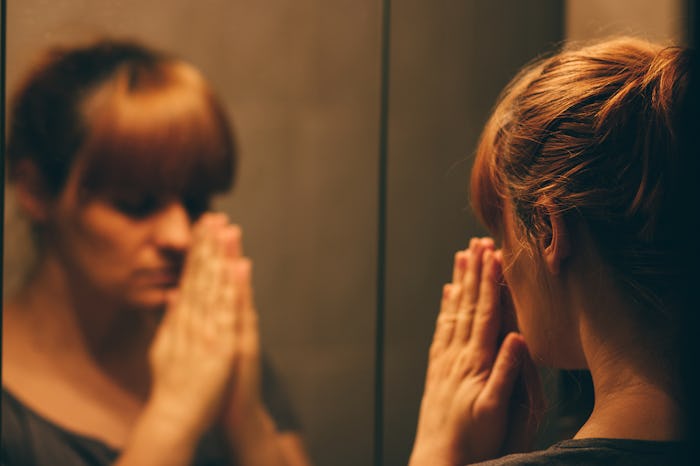Life

7 Struggles Every Woman With Postpartum Anxiety Knows All Too Well
When I was a new mom I moved to a new town, far from family and friends. My husband worked 12 hours a day, leaving me completely alone with my newborn. I'd never heard of postpartum anxiety but, like any new mom, I found myself worried about my baby. I thought my worries were a normal part of new motherhood. I worried he wouldn't be healthy; I worried I would drop him; I worried about SIDS. In hindsight, it seems obvious that I was experiencing struggles women with postpartum anxiety knows all too well.
My worried didn't seem to end but, instead, compounded until an endless loop of anxiety was part of my day-to-day life. I worried I was harming him and I worried he wouldn't grow and I constantly worried he would die. My worries took on a life of their own and consumed me. I began to have intrusive thoughts that were nothing short of frightening, complete with scary images and possible scenarios. Due to my lack of a support system and isolation, I didn't have anyone to talk to about my fears. As a result, I assumed they were the normal kind of fears all new moms have.
After 18 months, I finally saw a doctor and was diagnosed with postpartum depression. I didn't mention to my doctor that I was having intrusive thoughts or that I was afraid all the time, because I didn't realize those feelings were abnormal. I understand now that what I was feeling were not typical "new mom fears." I had postpartum anxiety (PPA). More information is (thankfully) coming to light about PPA and findings suggest it's even more common than postpartum depression.
If any of these struggles that moms with PPA know all too well resonate with you or seem a little too familiar, please contact your doctor immediately. You're not alone, and you definitely deserve help and support.
When You Feel Like The Worst Mother Ever
Every new mom has concerns and questions about motherhood and how to parent a child. Everyone worries that they may not hit all the bullet points on the "Good Mom Checklist," but when you suffer from postpartum anxiety these worries consume you. You convince yourself that everyone you see is going to realize the truth: that you're an unfit, bad mom. You are positive that every knock on the door will be social services, coming to take your baby away.
When You're Convinced You're Doing It Wrong
When you suffer from postpartum anxiety, you are constantly on edge. There is a surety that you aren't doing normal things — bathing your baby, feeding your baby, playing with your baby — correctly or in a way that will benefit your newborn. So, you Google everything and research everything and still you convince yourself that you are failing.
When You Think Something Is Wrong With You
"What is wrong with me? Why is this so hard? Why did I think I could do this?! I'm not made for this. Other women have something I don't."
When You're Sure Something's Wrong With Your Baby
Everything your baby does seems to indicate a problem. You over-analyze every movement and sound and bodily function, convincing yourself that everything is a symptom of some (probably fatal) condition.
When You Constantly Worry Your Baby Will Die
Every mother worries about Sudden Infant Death Syndrome (SIDS). Every mother worries she may lose her baby in some unforeseen accident.
However, when you have PPA, you become fixated on all that worry. Everything becomes a potential threat, even the most innocuous things. You stay up nights watching your baby breathe or you lie awake imagining every scenario in which your baby might die.
When You Have Terrifying, Intrusive Thoughts
Intrusive thoughts are terrifying. It's like every worst-case-scenario grabs hold of your imagination and won't let go. They're relentless, and while you're having them you think, "Wow, that's a f*cked up thing to think." Still, no matter how you try to rationalize it, you can't let it go.
When You Feel Completely Alone
In the midst of all this fear and anxiety, you feel isolated and alone. You're afraid to tell anyone how you're feeling because your anxiety makes you ashamed. You'll convince yourself that people will judge you and shame you and (sadly), because the stigma surrounding mental health and wellness is so very real, some people might. So, you think if anyone knew how you felt, you'd lose your baby. You feel like there is no one in the world who could possibly understand the things you're feeling
Postpartum anxiety is scary but it's nothing to be ashamed of. If any of these struggles resonate with you or if you experience one or more of these symptoms, please seek help. You are not alone.